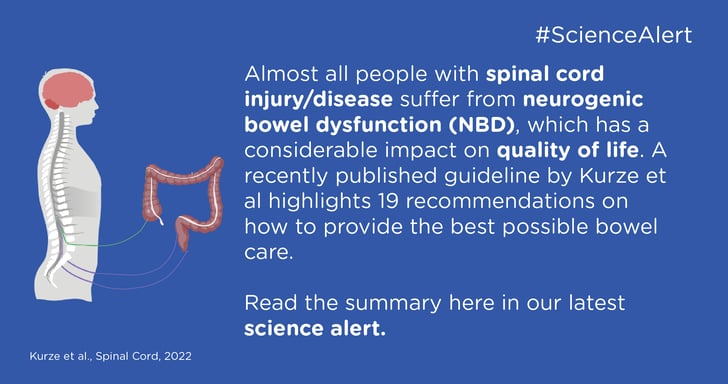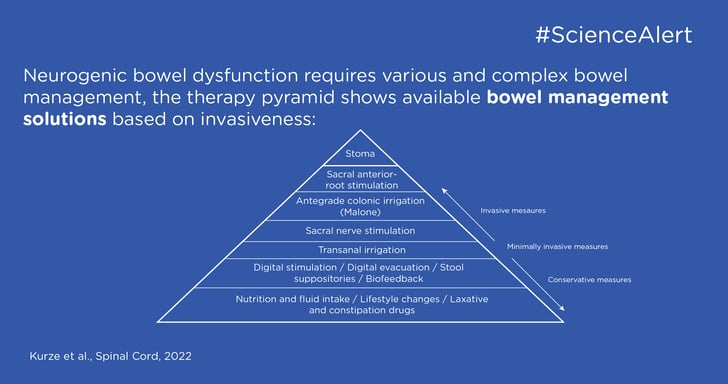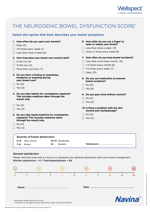Bowel dysfunction in spinal cord injury is very common and the guideline summarized here aims to provide practice-oriented support for bowel care in spinal cord injury patients. It is well-known that neurogenic bowel dysfunction (NBD) affects quality of life after spinal cord injury and bowel management is important to maintain health and well-being. To achieve a successful bowel management, it requires interdisciplinary teams working together.

What is neurogenic bowel?
The symptoms of neurogenic bowel are fecal incontinence and constipation. In order to obtain a proper medical history to diagnose neurogenic bowel, the following signs and symptoms need to be checked:
- stool quantity and consistency using Bristol stool scale
- perception of the need to evacuate (urge)
- triggering defecation through digital stimulation
- diet
- medication
- episodes of fecal incontinence
- unsuccessful attempts at voiding
A part from the medical history, an assessment of the abdomen and anorectal examination is needed. The guideline points out that medical history and assessment of anal sphincter tone are essential for initial diagnosis.
What causes neurogenic bowel?
Neurogenic bowel dysfunction is due to the damage of, or disease affecting the nerves in the spinal cord. The nerve damage disturbs the sensory function, motility and reflex control of bowel. Change in bowel function after spinal cord injury or disease depends on the level of the lesion, the completeness of the injury, and the time since onset of the disease. Clinically important factors are:
- the effect on the motility of the bowel (peristalsis)
- ability to empty rectum
- function of anal closure mechanisms
Can neurogenic bowel be cured?
The overall goal of bowel care in spinal cord injury defined by the group of experts is following:
- Self-management leading to regular and predictable bowel emptying at a socially acceptable time and place
- Using minimal physical and pharmacological interventions to achieve complete bowel emptying within an acceptable time frame
- Prevention of bowel accidents, constipation, autonomic dysreflexia and other complications
A recommendation by the guideline is to determine the bowel emptying frequency, technique and the use of laxatives and aids for the established bowel management. Following this one should assess continence, defecation time and subjective patient satisfaction for evaluation of the bowel management.
Neurogenic bowel complications
A neurogenic bowel has great impact on everyday life and complications can have serious health consequences, from life threatening conditions, such as autonomic dysreflexia, to social isolation due to lack of bowel control. Autonomic dysreflexia is a syndrome that can occur in spinal cord injuries above T6. It is a sudden increase in blood pressure commonly triggered by distension of the bladder and the bowel. Bowel management is therefore important to reduce distension of the bowel at the same time as bowel management may be a trigger of an autonomic dysreflexia episode. If the patient is at risk for autonomic dysreflexia, this must be considered in selection of bowel management. Noted is that symptoms of autonomic dysreflexia occur less frequently and to a lesser degree with transanal irrigation than with digital evacuation.

How to treat neurogenic bowel
Bowel management is individual and refers to all activities that help a person with NBD to achieve regular, planned and time-limited bowel evacuation, to avoid complications and unplanned defecations. There is limited evidence due to lack of clinical studies, but it is agreed that an individual bowel management should be developed based on diagnosis and considering different lesion types. Neurogenic bowel management usually requires more than one procedure to get control of bowel after spinal cord injury. In this guideline by Kurze et al you can find several recommendations concerning everything from when to manage the bowel, when it is time to change bowel management, dietary advice, bowel evacuation techniques, use of pharmaceuticals to surgical treatments.
An additional way to help healthcare professionals evaluate and monitor the symptoms of neurogenic bowel and how this impacts the quality of life for their patient, is through the NBD (neurogenic bowel dysfunction) score. Here you can find an adult NBD score and a pediatric NBD score that you can download and use together with your patient to help identify the severity of their bowel dysfunction and how to move forward with their bowel treatment:

Download the Pediatric NBD Score

ISCoS Webinar: Tips and tricks with transanal irrigation – how to succeed with your bowel management
If you would like to learn more about spinal cord injury and bowel care, specifically with focus on transanal irrigation, make sure you tune into our latest webinar collaboration with the International Spinal Cord Society. In this webinar, a panel consisting of webinar host, Camille Lichtenstein, Global Lead Business Excellence, Wellspect, Helena Gomes Delgado, Ward Manager at Daniel's Rehabilitation Unit and Jane Stanbridge, Neurogenic Specialist Nurse and Director JPEL Training Ltd, gather together to discuss tips and tricks with transanal irrigation – how to succeed with your bowel management.





